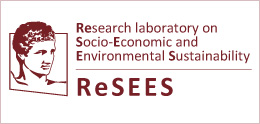Third Society for Benefit-Cost Analysis | European Conference 2022
The Society for Benefit-Cost Analysis (SBCA) held its 2022 European Conference (SBCAEC2022) November 3-4, 2022, in Paris, France on the Paris School of Economics Campus.
The aim of the conference was to promote and improve the theory and application of the tools of benefit-cost analysis, that is, to have both a research and policy focus and to provide a forum for scientific exchange.
On Friday November 4, Prof. Phoebe Koundouri was invited as a keynote speaker and gave her speech on "Science- Based Sustainability Transformation: A Historical Challenge with a Wealth of Opportunities"
Given the current era of multiple interconnected crisis (climate change, biodiversity collapse, COVID-19 pandemic, inflationary pressures, population and inequality increase, energy and food supply shortages, geopolitical instability) and based on the 2021 and 2022 UN SDSN reports on the "Transformations for the Joint Implementation of Agenda 2030 for Sustainable Development and the European Green Deal" that I lead, the first part of my keynote speech will connect the dots between four major policy initiatives – the SDGs, the European Green Deal, the European Semester, and the EU recovery plan, and showcase actionable strategies for policymakers that can guide EU-wide and national economic recovery in line with the EU's overarching sustainability agenda. I will also argue that the transformation to sustainability should be science-and-innovation-driven and introduce relevant aspects of my work (research projects, innovation accelerators and science-policy interface building) under the Alliance of Excellence for Research & Innovation on Aephoria that I lead. One crucial element of the sustainability transformation derives from the fact that in most instances, objective probabilities about future events are difficult to estimate. In the second part of my keynote based on Pittis, Koundouri et al., I will argue that although there exists empirical evidence of ambiguity aversion (aversion to unknown probabilities) violating Subjective Expected Utility axioms, ambiguity aversion can dissolve into time-inconsistency, if the agent forms her probabilistic beliefs within the context of modern Bayesianism (MB). This result points to the need for training decision-makers in time-consistent decision-making and BCA.
The Society for Benefit-Cost Analysis (SBCA) is an international group of practitioners, academics and others who are working to improve the theory and application of the tools of benefit cost analysis (BCA).
Both theoretical and empirical contributions (based on the various methods used to support public sector decision making, including Benefit-Cost Analysis (BCA), cost analysis, cost effectiveness analysis, risk-benefit analysis, and damage assessment) were welcomed.
All topics related to BCA are relevant such as non-market valuation, discounting, equity, social policy, regulation, implementation of BCA, etc., and applications to any public policy area, such as Environment, Transport, Aging & Healthcare, Energy, Urban etc.




 Πατησίων 76
Πατησίων 76 30 2108203 455
30 2108203 455
